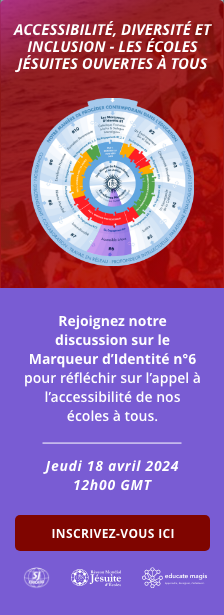500 years back St. Ignatius was seriously wounded when he was struck by a cannonball that shattered his dreams of self-glory transforming him from a passionate soldier into a compassionate pilgrim committed to the glory of God. After his recovery during the process of transformation, on meeting a beggar he was struck with compassion that led him to exchange his knightly robes for the rags of the beggar.
The Society of Jesus that he founded, unlike other religious congregations of his times, was not confined to the four walls of the monastery. He dared to seek and find God in all things. His spirituality was considered so unconventional that he was accused of being a heretic and imprisoned a couple of times. “If our church is not marked by caring for the poor, the oppressed, the hungry, we are guilty of heresy.” This quote of Ignatius is an indicator of his radical compassion for the poor.
We are fortunate to be a part of the rich Ignatian legacy and the numerous blessings that have been showered through it upon the world are urging us to move forward with courage that breeds hope.
The interrelated twin crises of Covid and climate change have shaken up the whole of humanity. It is impossible to carry on as before. The world has drastically changed and will continue to change. Are we facing a cannonball moment in the history of humanity? How do we respond so that we are transformed to play our role as contemplatives in action at this time of irreversible change?
Of the key values in Jesuit Education namely, Competence, Conscience, Commitment and Compassion I would like to highlight ‘Compassion’ at this critical juncture. Pope Francis in his popular encyclical Laudato Si addressed to leaders of all nations called for an integral response to the cry of the poor and cry of Mother Earth. It is becoming evident that in the Covid -19 pandemic and the climate catastrophe that it is the poor and the earth who are the worst affected.
How can Jesuits and collaborators of all faiths be radically transformed so as to become compassionate citizens not only of our own countries but of our planet that is facing climate catastrophe? It is imperative to make a paradigm shift from “Me” to “We,”namely, from an individualistic mindset to a communitarian consciousness. This awareness is best expressed by the African phrase Ubuntu: ‘I am because we are’. The Indian tradition of Oneness offers the holistic vision of ‘Vasudhaiva Kutumbakum‘ ie ‘The World is one Family,’ including humans and all species.
Like Ignatius we are being called to strive no longer for personal glory but God’s greater glory expressed in the common good of humans and Mother Earth. Like the global sweep of technology the twin crises are making us painfully aware that we are a part of an interconnected, interdependent universe. We are being challenged to look for solutions from the domestic to the global to the planetary family, including all species.
It is important to recognise that “Compassion” is not mere pity or sympathy for the poor that leads to offering donations to assuage our conscience. We need to go beyond traditional methods of charity and awaken our conscience so that we can respond with empathy. This implies going to the roots of the problem rather than offering band aid solutions. Bonding as equals in healthy kinship and taking a stand for human and Earth rights can foster a culture of solidarity and oneness.
Like Ignatius we are being challenged to make a paradigm shift from our self-centred approach to a compassionate one. “Kindness gives to another. For compassion there is no ‘Other’.” This striking quote captures the essential difference that true compassion makes. We are being called as compassionate citizens to the mission of nurturing Mother Earth and the poor who are an integral part of our lives.
A pertinent question to ponder and act upon: Would starting a Campaign for Compassion be an appropriate way of celebrating the 500th anniversary of the cannonball moment?

Se connecter ou Adhérer
pour créer et afficher des commentaires

